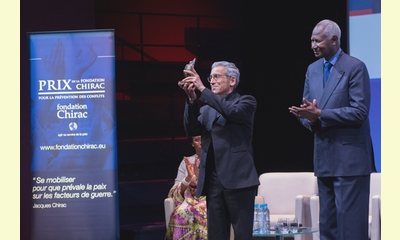|
|
Chirac Foundation Prize for Conflict Prevention
un article par International Organization for Francophonie (abridged)
The award ceremony of the Chirac Foundation for Conflict Prevention was held November 22, 2012 in Paris. As guest of honor at the ceremony, the Secretary-General of the Francophonie, Abdou Diouf, awarded the prize to two winners.

Father Francisco de Roux and Abdou Diouf (Cyril Bailleul/OIF)
click on photo to enlarge
These awards are intended to raise awareness and recognition by the international community of people who are dedicated, often risking their lives, to the promotion of dialogue and reconciliation in countries beset by conflict. The prize is meant to help the recipient find the necessary means for the continuation of his or her work, and to engage others in the task.
The Chirac Foundation Prize for Conflict Prevention, which honors the work of representatives of civil society, was presented to Father Francisco de Roux for his action in favor of development and democracy in Colombia.
Here is an Extract from the speech of Abdou Diouf during the award to Father Francisco de Roux:
". . . Who would have thought possible that the guns would fall silent in the Magdalena Medio region, one of the most violent regions in central Colombia, a region where murder, rape, abduction, forced recruitment of children used to terrorize people every day?
Who would have thought possible that this region, the poorest, could find an alternative to coca cultivation and engage with success on the path of economic development that is equitable and sustainable?
You believed it would be possible, and by your tenacity, peaceful resistance and courage you have allowed the men, women and children of this region to break with a past that seemed inevitable, to reconnect with a present acceptable to all, and especially to find hope again in the future, their future, and the future of their children and their country. . . "
The Special Jury Award, which recognizes individuals working for institutions, was awarded to Radhika Coomaraswamy, former Special Representative of the Secretary General of the UN, for her action in favor of the protection of children in armed conflict.
Here is an extract from the speech of Abdou Diouf during the award to Radhika Coomaraswamy:
"... From the Security Council to the Commission on Human Rights, every organ of the United Nations is working in its own way, and you, within this context, played a key role, first of all, as Special Rapporteur of the Commission on Human Rights of the United Nations on violence against women, then as Special Representative of the Secretary-General for Children and Armed Conflict, which is why today you are receiving the Special Jury Prize of the Fondation Chirac.
Throughout these years, you have traveled the world to interview victims and to convince governments. And it is a phrase that summarizes perfectly the spirit in which you have performed this demanding mission when you have said: "I have forgotten the faces of most of the national or international authorities I encountered, but I have never forgotten the faces of the victims. . . '
(Click here for a French version of this article)
|








|
DISCUSSION
Question(s) liée(s) à cet article:
What is happening in Colombia, Is peace possible?
* * * * *
Commentaire le plus récent:
The force of non-violence constrains the force of arms!
Colombia - the force of peaceful resistance -
At the beginning of July, the rebels of the armed revolutionary forces of Colombia (FARC) kidnapped a 51 year old Swiss, and his Colombian assistant who worked in the Indian communities of Cauca province where they were setting up development projects by building schools and community production enterprises.
The news of the kidnapping was spread through all the villages and 2000 Indians set out to pursue the 400 guerillas. They reached them at an elevation of over 4000 meters (12,000 feet), encircled them, and without any weapon, constrained them to release the 2 hostages! (After 2 days, the hostages were released).
This release, obtained through "peaceful resistance" has raised a national debate: the possibility of resisting violence without needing to use weapons has demonstrated the effectiveness of human solidarity movements.
"I will return, and I will then be millions" prophesied the Aymara Indian leader Tapak Katari, in 1781, at the time of his execution by the Spanish conquistadors.
100 million in 1492, the Indians were no more than 4,5 million one century and half later. Currently there are 44 million Indians populating Latin America.
In spite of their great diversity, the Indian movements take on more and more importance. In Ecuador, Guatemala, Bolivia, Peru, Mexico or Colombie they are opposed to the neoliberal system that governs the Americas, while protesting against the imposition of the American economic market. . ... continuation.

|
|









